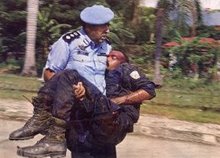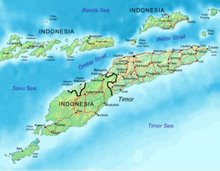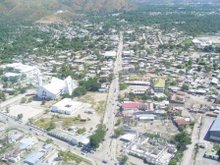"I'm encouraging you to participate and choose the right person for our president. We have been experiencing a very bitter life, and you have also seen how this current government runs the country. So don't make another mistake by choosing the wrong leader," Bishop da Silva said in a letter read in churches on March 25.
The bishop also urged people in this predominantly Catholic country to carefully study manifestoes put forward by the candidates. He reminded them of how they have faced poverty and violence. "We want to see people living in peace in their own homes, not in refugee tents where they are unsafe and susceptible to illness and death," Bishop da Silva said in his letter.
Campaigning for the April 9 presidential election kicked off on March 23. Eight candidates are in the running to succeed President Alexandre "Xanana" Gusmao, who is not running for a second five-year term.
Among frontrunners are Prime Minister Jose Ramos-Horta, Fernando Lasama from the Democratic Party and Francisco Lu Olo from Fretilin, the country's largest political party. Campaigning is scheduled to end April 4.
Ramos-Horta, considered the most popular candidate, shared the 1996 Nobel Peace Prize with Bishop Carlos Filipe Ximenes Belo, then apostolic administrator of Dili. Though a Fretilin founder, he is now an independent.
In June 2006, he resigned as foreign minister in protest following months of violence in Dili. The rioting began after then-prime minister Mari Alkatiri dismissed 600 of the army's 1,400 members for protesting alleged discrimination. Alkatiri was forced to resign that same month, and Ramos-Horta took over as prime minister. At least 20 people died and 100,000 were displaced in the violence.
In a recent campaign speech in Dili, Ramos-Horta told a gathering of approximately 4,000 people: "If I'm elected as president of this country, I will work together with the Church to solve this crisis." He said he would bolster Church-State cooperation to develop the country, because Timor Leste (
Lasama, also in a campaign speech in Dili, promised an estimated 2,500 people that he would be strict on law enforcement if elected and would make the country prosperous for all its people.
NGO worker Antonio Soares told UCA News the coming election is "very important" because the current government has "failed" to solve the country's current crisis.
Father Ermelindo Soares, in charge of Comoro parish in Dili, told UCA News on March 27 that Bishop da Silva and Bishop Basilio do Nascimento of Baucau, who heads the other diocese in the country, have directed priests not to be involved in politics. "I am conscious that our role is to guide people in spiritual and social matters, not in politics," he added.
Nuns too have been instructed not to get involved in politics, according to Sister Carminda de Jesus, a nurse at Motael Clinic in Dili. "What we can do is to encourage people to vote, but we do not tell people which leader to choose," she told UCA News. Nonetheless, she insisted that nuns and priests have a duty to denounce injustice, especially against poor people.
In addition to the presidential election,







Sem comentários:
Enviar um comentário